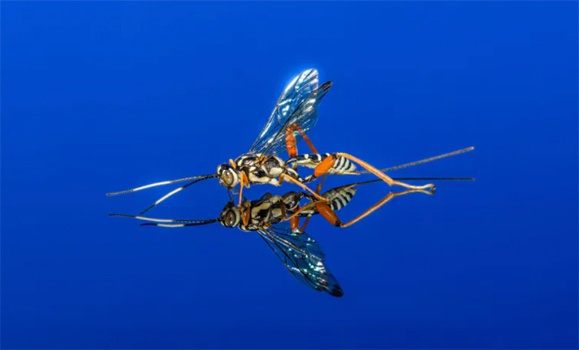is a PhD student in Neuroscience at and is a Professor of Psychology and Neuroscience at .
Wasps have a because of their perceived aggressiveness and ability to sting repeatedly. TheyŌĆÖre often negatively compared with the honey production and agricultural pollination of bees.
If wasps are jerks, however, they are positively saintly compared to their parasitic brethren.
Parasitic wasps sting to inject their eggs into a host, often accompanied by venom and a virus. Their larvae grow and eventually emerge from the unwitting host ŌĆö usually killing it. Then they becoming adults and fly off to continue the cycle.
Some wasps go further, controlling their hostŌĆÖs behaviour, effectively ŌĆ£zombifyingŌĆØ them to help the larva survive. After studying the behaviour of ichneumon wasps, which lay their eggs in moth larvae, naturalist Charles Darwin wrote that they were so evil that they were proof against the idea that God was directing evolution:
ŌĆ£.ŌĆØ
While no wasps are known to lay eggs in humans (although ), they have inspired films like the Alien franchise and the recently released monster survival video game .
But whether inspiring horror or metaphysical questions, parasitic wasps also save millions of human lives.
Parasitic wasps to the rescue
In the 1970s, the cassava mealybug (Phenacoccus manihoti) entered Western and Central Africa as an . It rapidly spread across cassava fields causing . The cassava plant is a staple food crop . The mealybug invasion threatened the .
The Swiss entomologist Hans Rudolf Herren, who was conducting research in the area, (Epidinocarsis lopezi). The parasitic wasp posed .
After and gathering funding, and co-ordinated to areas affected by the mealybug. From those locations, the wasp populations grew and spread on their own, .
This effort , billions in crops and avoided the use of pesticides. Herren received the .
Biocontrol heroes
, and this was far from the only successful case of wasps as biocontrol. Wasps have successfully defended against many crop pests .
The samurai wasp (Trissolcus japonicus) was being studied for potential use against the brown marmorated stinkbug, a threat to many crops across the continental United States. However, the wasp preempted this, .
Wasps are even being deployed to prevent moths from . Here in Canada, at least four wasp species have been , a cause of deforestation across Canada.
Read more:
Pros and cons
Biocontrol has several advantages over pesticides. Populations can grow and spread on their own, as demonstrated by the samurai wasps, whereas pesticides typically need humans to spread them. Organisms can , while pesticides often require repeat applications. Pests can also evolve to resist pesticides in . And as biocontrol uses another organism, they can evolve in response the pestŌĆÖs defences.
Biocontrol is not free from issues. It often introduces a new invasive species to deal with an existing one. It can be difficult to .
For example, the cane toad was introduced in Australia to eat several insect pests there. Instead, the poisonous toad , disrupting many other parts of the ecosystems there.
Parasites may avoid some of these issues as, unlike predators, , making them less likely to go off-target and affect species other than the intended one.
Given that and (), this gives a legion of options to study for safe and effective pest management.
So next time youŌĆÖre online and see wasps being unfairly maligned, consider the millions of humans across the world who are alive and able to feed themselves because of them. And maybe this upcoming Halloween, should you encounter the spirit of a certain 1800s English naturalist going on about the theological implications of parasitic waspsŌĆÖ evil, tell him of the good they can do.![]()
This article is republished from under a Creative Commons license. Read the .

